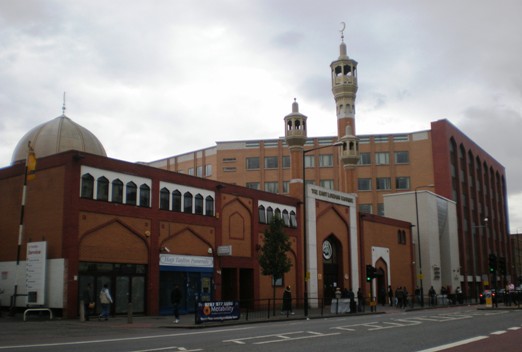Muslims march and burn book insulting their prophet Mohammed; London 1938
This is new to me (if it isn’t to you then I’m late to the story). While I was sitting in Betty’s of Harrogate debating between a Yorkshire curd tart and a Fat Rascal scone my husband was at the Museum of London and spotted a very brief mention of this protest in 1938 on a list of 20th century London events. I did some research.
The book they objected to was HG Wells’ A Short History of the World. This was originally published in 1922 but in 1938 an abridged version was tranlated into Hindustani and published in India. His observations about the Prophet Mohammed did not find favour with Indian Muslims (and as you know pre-partition the area called India covered what is now Pakistan and Bangladesh). There were protest meetings in Calcutta and Mumbai (then transliterated as Bombay) and the consignments of the books that WH Smith the booksellers sent to Hyderabad mysteriously never arrived. Investigation showed that the Sind government banned its import. Protests spread to east Africa and were reported in Nairobi and Mombasa.
The paragraphs concerned said ” “He seems to have been a man compounded of very considerable vanity, greed, cunning, self-deception, and quite sincere religious passion”. Well’s concludes, not unfavourably, that “when the manifest defects of Muhammad’s life and writing have been allowed for, there remains in Islam, this faith he imposed upon the Arabs, much power and inspiration”.
There had been a number of Muslims living in east London for some years, sailors who came through the docks, retired servants, some professional men and in 1934 they formed a charitable association for the promotion of Islam called Jamiat-ul-Muslimin; they met on Fridays at a hall in Commercial Road.
On Friday 12th August 1938 a copy of A Short History of the World was, as apparently reported in the Manchester Guardian the following day ‘ceremoniously burned’. The main Nazi book burnings were over 5 years previously but I can’t but be reminded of them. I can’t access the Guardian on-line archive for 1938 as I don’t have a subscription, but I have not reason to doubt what they reported.
A few days later Dr Mohammed Buksh of Jamiat-ul-Muslimin attended upon Sir Feroz Khan Noon, the high commissioner for India. Sir Feroz tried to explain that in Britain we could (or could then) freely criticise Christianity, the Royal family and government as a right. He reminded Dr Buksh that Muslims were “a very small minority in England, and it would do them no good to try and be mischievous in this country, no matter how genuine their grievances were”.
Dr Mohammed Buksh and Jamiat-ul-Muslimin were not satisfied and organised a march from the East End to India House in Aldwich, off the Strand. That’s a lot longer a route than a modern demo. Down Whitechapel, past Gardiners Corner and Aldgate pump where Mosley’s blackshirts were turned back two years previously, into Fenchurch Street and the City of London, I think the Pathe newsreel above shows them passing Ludgate Circus from where they would have entered Fleet Street and then to the Strand.
They handed the Indian High Commissioner a petition calling on HG Wells to apologise and amend that chapter.
Note from the newsreel that even in 1938 Muslims demonstrating attracted a fan club of young Englishwomen. Note also the call of Allah Akbar.
HG Wells was unperturbed by the commotion. So far as I can find he was never personally threatened and no fatwa was placed on his head.

However Jamiat-ul-Muslimin formed branches in Birmingham, Manchester and Liverpool, Wales and Scotland. The Birmingham one still exists. The east London branch was instrumental in the setting up of the East London Mosque in Whitechapel in 1941 and were involved in a struggle for power there in 1943. As a child in the 1960s I wasn’t aware of a mosque in the area (a couple of ordinary houses in Commercial Road); now no one can ignore the complex which can now only grow upwards it has taken over the whole block, including the Great Fieldgate Street Synagogue.
I found an article in The Telegraph of India from 2017 called Too many thin skins – A forgotten precursor to the Rushdie affair. The writer compares the two protests. The first when Muslims in the UK could be numbered in the several thousands, 50 years later in hundreds of thousands, 30 years after that 2.5 million, one million of them in London.
He concludes
There is one last thought I would like to leave the reader with. In the land of our former colonizers, one can make fun of gods and kings, without having one’s book burnt or film banned. Regardless of the party in power, the government of the United Kingdom is firmly committed to protecting the freedom of expression of writers and artists. In this respect at least, Christian Britons are far more civilized, far more broad-minded, than Indian Muslims or Indian Hindus.
I’m not sure how true that is any more, but it is an ideal we should aspire to return to.